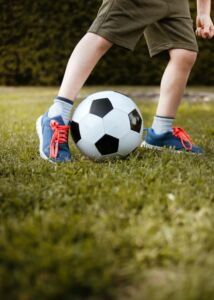Kids grow fast, and their bones support their growth and activity. Bone health is often overlooked in kids because signs of poor bone health often don’t appear until later in life. Osteoporosis– a condition that causes very thin bones that break easily is often described as “a childhood disease with old age consequences.” Bones gain most of their mass during childhood and adolescence. In fact, 90% of a person’s peak bone mass is gained by age twenty. By age, thirty people reach their peak bone mass.
Bones are living tissues, and they are constantly breaking down and building back up. Until a person reaches their early thirties, bones build up faster than they break down. In our thirties, this changes, and bones no longer gain mass. The challenge after that is to maintain as much mass as possible. People who have denser bones at age thirty are less likely to experience osteoporosis later in life. That’s why building bones during childhood and adolescence is so important.
Here are four ways to make sure your kids build healthy bones.

1. Help Picky Eaters Get Their Nutrients.
You probably know that minerals like calcium and magnesium, as well as vitamins K and D, are vital for bone health. Kids sometimes have trouble getting all the nutrients they need. Young kids are often picky eaters, and teens sometimes choose soda and sweets over more nutritious options.
You can try disguising healthy foods to help picky eaters and less than health-conscious teens get the nutrition they need. Chocolate milk or flavored nutrition drinks like PediaSure are great options for kids who don’t like milk products. You can also try offering calcium-fortified cereals or other calcium-rich foods like almonds, leafy greens, or soy products. Incorporating some of these foods into casseroles, pasta, or other meals can help your whole family get necessary calcium and minerals. Lactose intolerant kids can drink plant-based milk that has calcium added.
Vitamin D is found in very few food items, including mushrooms and fatty fish. Most of our vitamin D comes from sunlight exposure, but many people live at latitudes where it’s impossible to get enough vitamin D from the sun for most of the year. Adults often take vitamin D supplements to remedy this. You can check with your child’s doctor about giving them a vitamin D supplement. A simple blood test can determine if your child needs more vitamin D. Even though sun protection is important, ten to fifteen minutes of sunlight (without sunscreen) per day won’t cause cancer and is necessary for vitamin D production. So encourage your kids to get outside and soak up the sun.

2. Educate Teens About Nutrition
Teen girls who are concerned about weight gain often think that drinking milk is fattening, and sometimes even teens who don’t have an eating disorder restrict their diets in unhealthy ways. Teens with eating disorders like anorexia nervosa or bulimia are at high risk for bone problems and sometimes develop osteoporosis in their twenties. These teens need to receive professional help quickly before permanent damage occurs.
All teens can benefit from explanations about bone health and nutrition. They should also know that skim milk, low-fat yogurt, and many other calcium-rich foods are part of a healthy, non-fattening diet. Teens are still growing and developing, and while keeping a healthy weight is important, they should know that being too skinny is just as unhealthy as being obese. Teens need calories and nutrients to support their development.
Many adolescents begin drinking soda and energy drinks instead of milk or juice. This can lead to less nutrient intake and ingestion of chemical additives and huge amounts of sugar. Highly processed foods, including soda, sweets, and anything made with white flour, contribute to inflammation throughout the body, harming bone and overall health. Sugary drink intake has been linked with lower bone density and a higher incidence of bowel cancer in people under the age of fifty.
Teaching kids about healthy eating from a nutrition focused perspective is less likely to encourage eating disorders than focusing on weight. When teens learn how to eat healthily, they set themselves up for better health throughout their lives.

3. Encourage Appropriate Exercise
Nowadays, it’s all too easy for kids to stay inside, glued to their devices. Active play has many physical, mental, and social benefits. Kids must be active to develop strong bones, muscles, coordination, and balance. Encouraging your kids to play or exercise for at least half an hour per day will benefit them in countless ways. Older kids and teens may need help learning how to work out or figuring out how much exercise they need. Many gyms and health centers will take new members, including teens, on an orientation tour and teach them how to use the equipment. You can also talk to a personal trainer or your child’s doctor about their fitness needs and get tips about how they can work out safely.
While some kids need encouragement to be active, others never stop going. This is usually fine, but teen girls must moderate their exercise to avoid hormone imbalances that can harm bone development. Female athletes and dancers sometimes overtrain. The most obvious sign of this is amenorrhea– when a girl’s period stops. If your daughter is sixteen and hasn’t started her period or if your daughter has had a regular period that suddenly stops, she may be over-exercising. Amenorrhea is a sign of low estrogen levels. Estrogen plays a key role in building bones, so correcting the problem quickly is important.

4. Take your Kids to a Chiropractor
Kids and teens benefit from chiropractic care just as much as adults do. Their growing bones go through a lot, from roughhousing to sitting in school all day. Chiropractic care can fix spinal issues like subluxations before they cause symptoms. Your chiropractor can also screen your child for scoliosis and help treat scoliosis.
Kids’ spines are more malleable than adults’. This means that they are more prone to injury but also easier to treat. When kids receive regular chiropractic care, we can prevent spine problems from becoming entrenched.
Care for Your Child’s Bones in Tennessee
At Stanlick Chiropractic, we treat adults and kids of all ages. We help families feel their best through spinal adjustment and nutrition and lifestyle counseling. Schedule a consultation today to find out how we can help your family meet their wellness goals.

